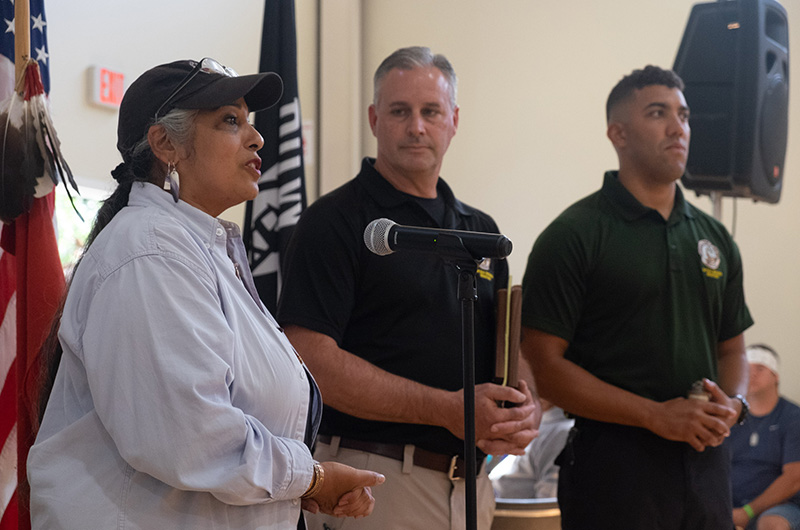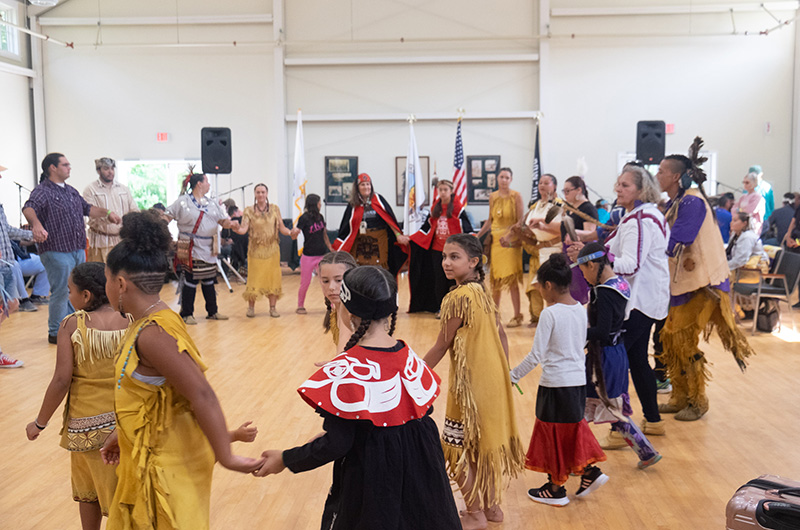Every year, the Wampanoag Tribe of Gay Head (Aquinnah) gathers for its annual powwow — a festive two-day celebration of tribal heritage that includes the crafts, dance, food, drumming and culture of native peoples that have occupied Martha’s Vineyard and beyond for more than 13,000 years.

A second definition of the term powwow refers to a conference, meeting or discussion by a group of friends. The 2019 Wampanoag powwow on Saturday included both.
As always, the festivities centered around ample feasting, singing and dancing at the tribal community center in Aquinnah. The tribe also honored two state environmental police officers in a special ceremony for the work they have done to promote tribal sustenance throughout the commonwealth.
Bret Stearns, tribal ranger and indirect resources administrator for the tribe, presented retired Lieut. Col. Anthony Abdal-Khabir and Maj. Patrick Moran with the awards, followed by an honor song from the Black Brook drum circle.
“This honor is really about listening,” Mr. Stearns said. “It’s about taking time to have a dialogue with one another, to understand the position of each other, and to learn how to find ways to work together so that we can provide opportunities for tribal citizens, and to have a pathway with the commonwealth of Massachusetts and the environmental police.”
After the honoring, Mr. Stearns, Mr. Moran and Mr. Abdal-Khabir took a direct step to put that mission in action, holding an impromptu discussion with nearly two dozen local and state officials, rangers and tribal members about the complex but important interplay between tribal rights and state regulations around sustenance living. Participants included local police, shellfish constables, hunters, foragers and others.
Although tribal members have the right to sustenance hunt, fish, and forage without state licenses, a tangle of legal and environmental issues often leads to confusion between the tribe and the commonwealth on current enforcement policies.
“One of the many reasons for the honoring that we had today was because of the great discussions we’ve had with Massachusetts environmental police about moving forward,” Mr. Stearns told the group gathered at the tribal community center in Aquinnah. “So dialogue is an important part of that. How do we communicate?”
Mr. Stearns said that while tribal members don’t need state licenses for hunting, fishing or shellfishing, they do still need to present proper identification to state environmental police officers in the field. He said his office has developed lobster tags so environmental police can easily identify tribal lobster pots, and that he hoped to make tribal identification cards easier for tribe members to obtain.

“The biggest thing, and we can’t stress this enough, is to have the tribal ID. Because that makes the encounter short and sweet,” Mr. Moran said.
There was also discussion about how tribal members still need proper licensing for the firearms they use to hunt, and must abide by private property rules like setbacks despite their expanded access and rights. Edgartown police officer Curtis Chandler requested continued communication between the tribe and local law enforcement. Retired Lieut. Col. Abdal-Khabir added that he hoped tribal members would not take offense when environmental officers ask for identification, emphasizing that most environmental police officers will only need to identify someone once.
“We existed, you existed. There was just no dialogue for years,” Mr. Abdal-Khabir said. “So we’ve taken that step to at least have these dialogues. And it’s been a very easy back and forth, and it’s worked very well in the last couple of years.”
The discussion broadened as it turned toward stewardship, particularly the sentiment that just because tribal members have the right to take natural resources, it doesn’t mean that it should be done recklessly.
“Even on tribal property, we meet all state and federal safety standards . . . and those standards are made to protect the resources that we want in perpetuity,” Mr. Stearns said.

Tribal member Ed Belain agreed.
“. . . state regulations are common sense,” he said. “I think we should follow them on tribal land. They are there for a reason.”
But Wampanoag medicine man Jason Baird said tribal access to hunting and fishing grounds continues to be constrained by increased development in Aquinnah and throughout the Island. He said many of his ancestral hunting locations now included roadways, houses and no trespassing signs.
“We’re responsible for taking care of our children and our elders, but we are faced with limitations,” Mr. Baird said. “Every year our territory is shrinking. But we intend to maintain, and we intend to say on this territory on our homeland and provide for our families as best we can, and I thank you gentlemen for your work in doing that.”
Forager and tribe member Kristina Hook said it is the responsibility of current tribe members to educate future generations about sustenance living, and that it is especially important today to practice sustainable hunting, fishing and foraging practices.
“It now becomes incumbent on you guys to think about what you take, and to take it with respect,” Ms. Hook said. “And to be really tribal about it. This, I believe, can be a first step. If you don’t teach your children, and you don’t teach your brothers and sisters, this wonderful gift that we have is going to go away.”
Mr. Stearns ended the conversation on a note of moving forward, requesting that hunters and fishermen reach out to the tribe with further concerns or questions. And as the smaller discussion powwow broke up after a round of applause, both native and nonnative Islanders returned to the larger one, eager to enjoy an afternoon of song, dance and delicious Indian tacos.







Comments
Comment policy »